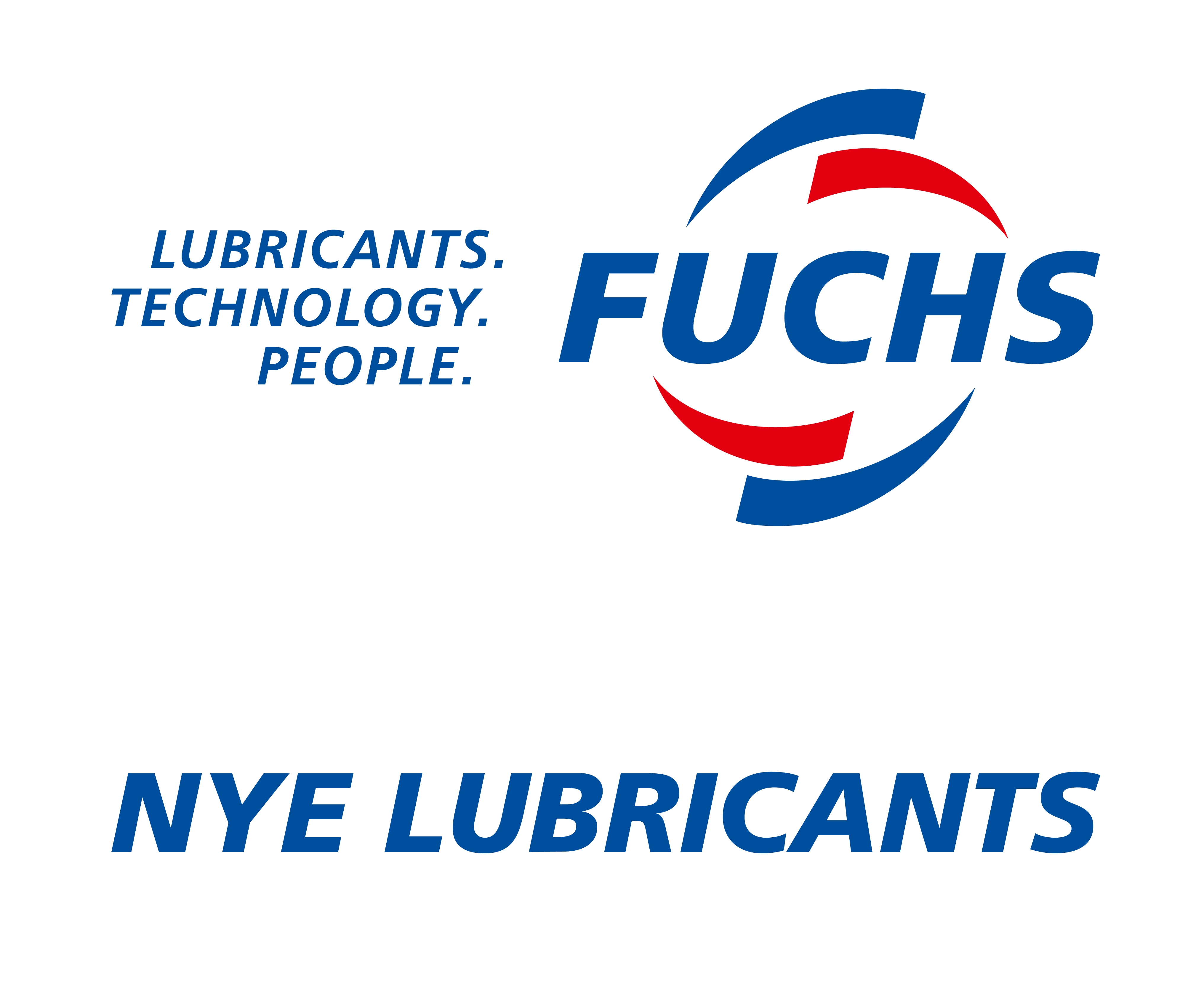Uniflor™- PFPEs
Nye’s Uniflor™ PPFEs are the most thermo-oxidatively stable lubricants available today. Unlike any other brand of fluorinated lubricants, the Uniflor™ line utilizes every available PFPE oil to create a diverse product line and achieve optimal performance under a variety of operating conditions. Uniflor™ products can withstand temperatures from –90 °C to +250 °C, and even higher excursions.

What are PFPE's?
Perfluoropolyether's (PFPEs) are fluorinated synthetic fluids that are well suited for the demanding environments or applications where chemical interaction between materials may pose an issue. While all PFPEs are composed of carbon, fluorine, and oxygen, the molecular structure of each PFPE fluid varies depending on the base materials and polymerization processes used by PFPE manufacturers. These structural differences will affect the fluid’s pour point, volatility, viscosity, and viscosity index — all critical factors in lubricant formulation. Some PFPE oils, for example, have a pour point of only -20°C, while others offer pour points as low as -90°C. Similarly, some PFPE oils offer better wear resistance and vapor pressure properties than others.
Advantages of Uniflor™ PPFEs
- Wide temperature performance
- Excellent oxidative and thermal stability
- Resistant to aggressive chemicals and solvents
- Nonflammable and chemically inert
- Low volatility and vapor pressure
- Excellent plastic and elastomer compatibility
Uniflor™ Lubricants For Your Industry
Below is a selection of our most commonly reccomended Uniflor™ products by industry.
To produce more powerful and efficient vehicles, automotive lubricants must be compatible with a range of materials while withstanding high temperatures. Uniflor™ lubricants are compatible with most plastics and elastomers and were designed to withstand harsh chemicals like brake fluid and exhaust fumes. PFPE’s high temperature stability helps protect against wear and arcing conditions to extend the service life.
- Anti-Lock Brake Bearings & Pistons
- EGR Valves
- Sensors
- Switches
| Product | Temperature Range | Evaporation | Kinematic Viscosity 100 °C 40 °C | NLGI Grade | Product Description |
|---|---|---|---|---|---|
| UNIFLOR 8172 | -45 to 225 °C | 0.23% | 18 cSt 167 cSt |
2 | General Purpose Use, OEM Specifications |
| UNIFLOR 8512 | -50 to 225 °C | 1% | 15.8 cSt 65 cSt |
2 | Improved Low Temperature Performance |
| UNIFLOR 8921 | -65 to 250 °C | 0.1% | 40 cSt 135 cSt |
2 | Very Wide Temperature and Corrosion Prevention |
Primary flight controls need to activate properly as desired by the pilot when the aircraft is in flight. Lubricating airframe components with a grease designed for high speed, wide temperature conditions will ensure proper long-term function and maintenance-free operation of these critical flight systems. Likewise, engine components, including the lubricant, must withstand a wide range of temperatures, be compatible with aviation fuels and resist corrosive fuel system vapors.
- Flight Controls
- Fuel Systems
- Electrical Systems
- Cabin Mechanisms
| Product | Temperature Range | Evaporation | Kinematic Viscosity 100 °C 40 °C | NLGI Grade | Product Description |
|---|---|---|---|---|---|
| UNIFLOR 8921 | -65 to 250 °C | 0.1% | 40 cSt 135 cSt |
2 | Very Wide Temperature Serviceability |
| UNIFLOR 8980 | -65 to 250 °C | 0.1% | 45 cSt 140 cSt |
– | Very Wide Temperature Oil |
| UNIFLOR 8172 | -45 to 225 °C | 0.23% | 18 cSt 167 cSt |
2 | General Purpose Use |
Thrust vectoring allows jets to direct engine power for maximum maneuverability, short take offs and landings. The actuator physically redirects jet propulsion, requiring a lubricant that survives the engine’s hot exhaust. Uniflor™ greases are well suited for defense applications as they resist hydrocarbon fuel and liquid oxygen.
- F-15 and F-16 Engine Thrust Actuators
- Hydraulic Systems
- Oxygen Systems
- Navigational Instruments
| Product | Temperature Range | Evaporation | Kinematic Viscosity 100 °C 40 °C | NLGI Grade | Product Description |
|---|---|---|---|---|---|
| UNIFLOR 8991MT | -60 to 250 °C | 5.1% | 90 cSt 310 cSt |
2 | Honeywell ES-2155 |
| UNIFLOR 8961MT | -80 to 200 °C | 3.31% | 21.7 cSt 71 cSt |
1.5 – 2.5 | MIL-PRF-27617 Type IV |
| UNIFLOR 8172MT | -45 to 225 °C | 0% | 18 cSt 167 cSt |
2 | MIL-PRF-27617 Type III |
Medical lubricants are often selected to prevent wear and/or seal applications against fluids and debris that might adversely affect patients. Uniflor™ lubricants resist chemicals to protect your components and minimize risk. Additionally, their wide temperature capabilities make Unifor™ the ideal choice for motorized, high temperature applications. For medical systems where proximity to patients causes concern for bio compatibility, our NyeMed® product line includes PFPE formulations that have been tested and certified.
- Lead Screws
- O-rings
- Bearings
- Bushings
| Product | Temperature Range | Evaporation | Kinematic Viscosity 100 °C 40 °C | NLGI Grade | Product Description |
|---|---|---|---|---|---|
| UNIFLOR 8981 | -65 to 250 °C | 0.18% | 41 cSt 136 cSt |
1.5 – 2.5 | Very Wide Temperature Serviceability |
| UNIFLOR 8512-FG | -50 to 225 °C | < 3% | 15.8 cSt 65 cSt |
2 | SF H-1 Food Grade Approval, Wide Temperature Use |
| UNIFLOR 8612 | -20 to 250 °C | 0.3% | 33 cSt 345 cSt |
3 | High Viscosity, Mechanical Damping and Sealing |
Validated to Minimize Risk
Uniflor™ lubricants are typically selected for applications with demanding operating requirements. To assure you that our lubricants are compatible with your application, Nye offers in-house validation testing for all our lubricants. Our test equipment can be modified to meet unique design specifications and allows us to simulate conditions like temperature, load, and even in-vacuum environments.
Want to learn more? Contact Us
Related Technical Articles & White Papers
SEMICONDUCTOR: Lubricants for Semiconductor Manufacturing Equipment
A primer on synthetic chemistries that explains why some lubricants are preferred for vacuum and cleanroom environments.
Read More

